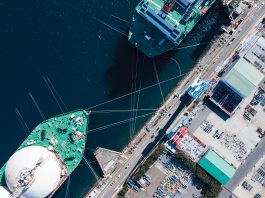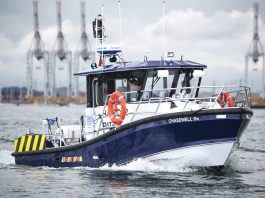Research conducted by the University of Manchester, UK, shows that ship exhaust emissions can alter the behaviour of clouds.
As published in the journal Environmental Science and Technology, researchers at the University of Manchester discovered that some ships in the open ocean were emitting large amounts of sulphates from traces of sulphur in the fuel, with a strong potential to alter behaviour of clouds and pollute coastal areas. When the team compared their results to ships in the English Channel, an area where emissions are regulated, they found that the amount of particulates were significantly higher in the open ocean.
Particulates, made of a mixture of soot and sulphates have long been known to alter the behaviour of clouds in the open ocean, creating lines of brighter clouds behind ships, called ship tracks, that can been seen from space, akin to the contrails often seen behind aeroplanes. The brighter clouds are partly caused by exhaust plumes containing pollutants from burning fossil fuels to power the ships. Scientists and shipping organisations are now studying the impact of increased regulations on the environmental cost of global shipping.
The results published by The University of Manchester represent the ‘before’ measurements of the particulates from ocean-going cargo ships. While studies have been published previously on ship emissions, these have been conducted in laboratory test rigs, which may not represent ‘real’ emissions, or in territorial waters or ports, where controls are already established.
The Manchester scientists used the UK Facility for Airborne Atmospheric Measurement (FAAM) Bae-146 large research aircraft to fly directly through the exhaust plumes of cargo ships in the busy Atlantic shipping lanes off the Portuguese coast in 2019.
Chenjie Yu, who authored this paper as part of his PhD studies at The University of Manchester, said: “It is a great experience to be on-board the FAAM research aircraft and performing this airborne measurement. The results from the ACRUISE project are crucial for the future policymaking and climate research.”
Starting in 2020, the International Maritime Organization (IMO) has placed new controls on emissions of all ships around the globe and the UKRI-funded ACRUISE project is designed to study the change this has, both on emissions and its impact on the environment.
The ACRUISE project is currently ongoing, and in 2021, the team will return to repeat the measurements, to assess how much of an impact the new controls have made. These will be combined with satellite data and atmospheric models to determine how much of a change this has made to air quality and climate.





